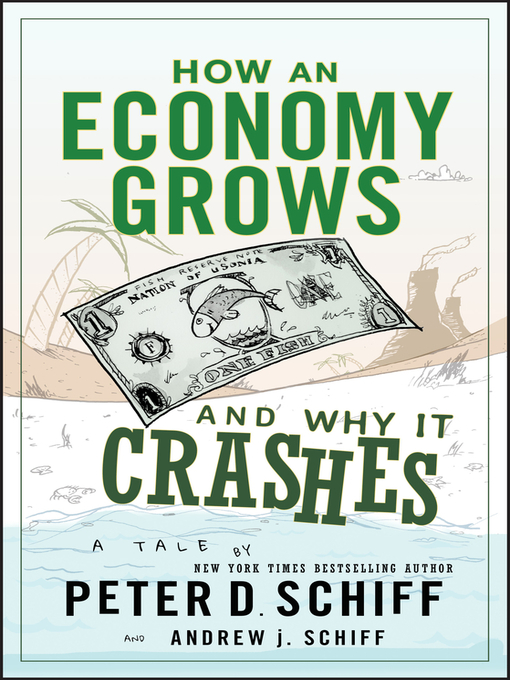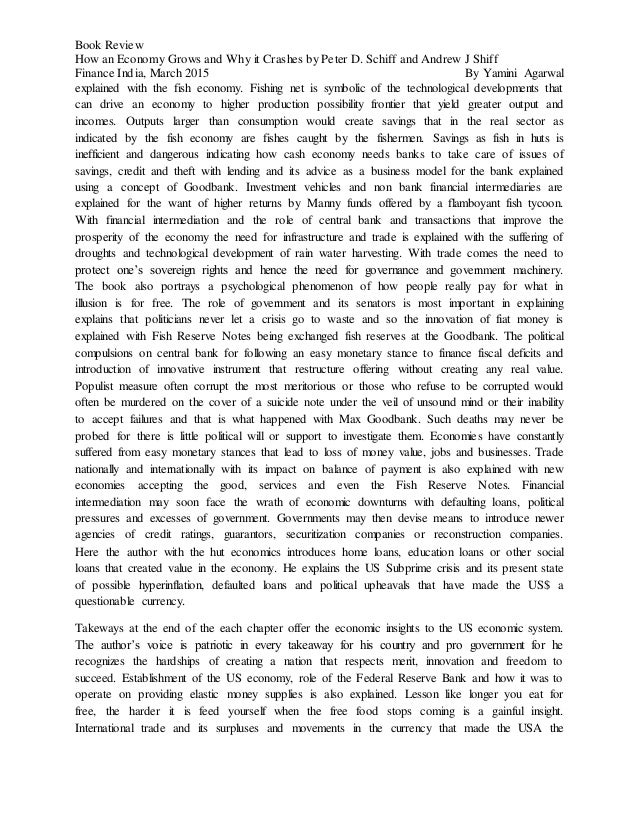How an Economy Grows and Why it Crashes uses illustration, humor, and accessible storytelling to explain complex topics of economic growth and monetary systems. In it, economic expert and bestselling author of Crash Proof, Peter Schiff teams up with his brother Andrew to apply their signature 'take no prisoners' logic to expose the glaring fallacies that have become so ingrained in our country’s economic conversation. Inspired by How an Economy Grows and Why It Doesn’t—a previously published book by the Schiffs’ father Irwin, a widely published economist and activist— How an Economy Grows and Why It Crashes incorporates the spirit of the original while tackling the latest economic issues.With wit and humor, the Schiffs explain the roots of economic growth, the uses of capital, the destructive nature of consumer credit, the source of inflation, the importance of trade, savings, and risk, and many other topical principles of economics. The tales told here may appear simple of the surface, but they will leave you with a powerful understanding of How an Economy Grows and Why it Crashes.
How An Economy Grows And Why It Crashes Audiobook
HOW AN ECONOMY GROWS AND WHY IT CRASHES By Peter D. Schiff and Andrew J.
Schiff Wiley, $19.95, 256 pages “How an Economy Grows and Why It Crashes” makes economics fun and accessible. Best-selling author and 2010 U.S. Senate candidate Peter D. Schiff and his brother Andrew J. Schiff, communications director of Euro Pacific Capital, convey the often intuitive ideas of economics through an engaging, fictitious story richly illustrated with amusing cartoons. The current economic path of the, some argue, is unsustainable. Americans understand this, yet many have been misled into believing that economics is hopelessly complex and the country would be at sea without a paddle if the government weren’t around to sort through the mess.
The Schiffs seek to provide readers with a “basic tool kit for cutting through the economic clutter” by sharing a revised and updated version of “The Fish Story” that their father, Irwin A. Schiff, presented in the well-known illustrated book “How an Economy Grows and Why It Doesn’t.” The story begins with three men on an otherwise deserted island who, in order to survive, have to spend all their waking hours catching fish with their bare hands.
Eventually they develop nets and other fish-catching devices that enable them to devote their time to various other pursuits. Immigrants arrive, and the economy becomes increasingly complex. Because of their universal value, fish are soon used as money. There is increased specialization of labor, and those who own capital, such as carts or saws, employ those who don’t.
A bank is created that provides a safe place for people to keep their money and provides loans for promising projects. At the end of each chapter, the Schiffs provide real-world take-aways from the story. The authors explain how the interest rates charged by today’s banks are affected by the “federal funds” rate set by the Federal Reserve, an institution they say is not above being influenced by politicians who seek to make the economy look better on the surface by making loans and mortgages accessible. Also a factor, they say, is that debtors who want to pay low rates form interest groups, but savers don’t join together to make their voices heard. In the story, the Republic of Usonia is formed to protect against domestic thugs and foreign invaders, with only those who pay taxes getting to determine how taxpayer dollars are spent. However, the government starts getting more creative after politicians find they can get elected by promising to fund various projects, all the while claiming that costs will be offset by the benefits of job creation.

According to the Schiffs, many economists use this same reasoning to conclude that natural disasters are economic stimulants. The Schiffs emphasize time and again something many already understand deep down - that prosperity comes from production, not from spending. “What if you spent $1 million but bought nothing but air? How would this benefit society?” they ask. Yet the jobs created from government stimulus money are more obvious to the public than the jobs that would have existed had those resources remained in the private sector.
To make up for the difference between expenditures and revenue, the government has to engage in what the Schiffs correctly refer to as “generational theft.” The authors argue that by selling vast amounts of our government debt to foreign governments such as China, we temporarily alleviate our economic problems, but the country is pushed closer to the day when other countries will have had enough of our dollars and the government won’t be able to pay for our extraordinary debt without massive inflation or huge tax increases. Since 1976, the has consistently imported more than it has exported. Such trade deficits are naturally self-correcting because they cause the country’s goods to become less expensive, which, in turn, makes demand for them increase. Yet, the Schiffs explain, we have been able to run consistent deficits because of our “monetary good fortune” of having the dollar accepted as the international exchange currency and the Chinese government not allowing the value of the yuan to increase relative to the dollar. The authors rightly warn of the economic downturn to come when these advantages inevitably end. Meanwhile, in the story about Usonia, the government issues more and more paper notes redeemable for one fish. To make the government’s fish reserves keep pace, the officials drastically reduce the size of the fish through some clever cutting-and-gluing techniques.
Eventually, after people start catching onto the fact that the fish they get back from the bank are smaller than the ones they deposited, they become less interested in saving and instead want to spend their money as quickly as possible to avoid losing purchasing power because of rapidly increasing prices. With less money saved, there’s also less money to be lent out for promising businesses or other economic projects. The effects of inflation in the are the same, although the decreasing value of the dollar isn’t quite as obvious to Americans as shrinking fish would be. In considering the causes of the recent recession, the Schiffs note that it’s difficult to overstate the impact of the housing boom, which they say was brought about by politicians who sought to make housing loans accessible to all. The authors blame the government for using Fannie Mae and Freddie Mac to guarantee housing loans to unreliable borrowers.
Economic resources, they say, were being diverted from better uses, and people were buying homes they clearly could not afford. Although incomes barely changed between 1997 and 2006, house prices increased by an average of 19.4 percent per year. The recent decline was needed to restore prices to their appropriate levels, yet the government has treated the drop as the problem rather than the cure, setting up the housing market for a potentially even more dramatic fall.


This book fulfills its goal of being accessible to lay readers and teaching Americans everything they need to know about our country’s bleak economic situation. True economic renewal and the return to free-market principles will be hard work and require swallowing painful pills, but we must resist the temptation to alleviate our problems temporarily at the expense of future prosperity. Roger Lott is a writer in Pennsylvania.